#Nick Dear
Explore tagged Tumblr posts
Text
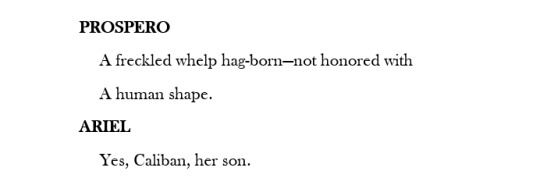


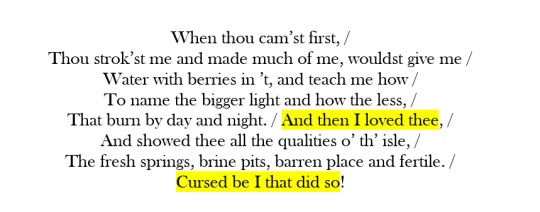



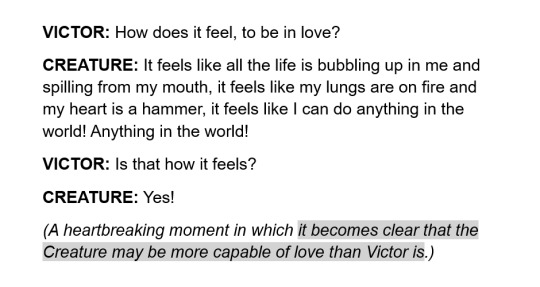


unlovable creatures quotes from: the tempest, shakespeare // henry vi part 3, shakespeare // frankenstein, mary shelley // frankenstein (play), nick dear
#( scheduled post )#I watched the globe's 2013 'the tempest' and felt violently compelled to make this#yes gloucester (future richard iii) belongs here#his “maker” never loved him either#the tempest#henry vi#richard iii#frankenstein#caliban#ariel#prospero#shakespeare#web weaving#web weave#quotes#danny boyle#nick dear
650 notes
·
View notes
Text


Benedict Cumberbatch - Frankenstein (Royal National Theatre, 2011)
#benedict cumberbatch#frankenstein#theatre plays#danny boyle#mary shelley#nick dear#frankenstein's monster#horror theatre#royal national theatre#2010s#2011
65 notes
·
View notes
Text



Persuasion (1995, Roger Michell)
01/10/2024
#persuasion#film#1995#roger michell#Scriptment#jane austen#england#1814#napoleonic wars#Bath Somerset#Amanda Root#united kingdom#Category 1995 films#Film genre#drama#Romance film#film director#screenplay#Nick Dear#film producer#bbc#cinematographer#john daly#film editing#Kate Evans#soundtrack#Jeremy Sams#scenography#Brian Sykes
12 notes
·
View notes
Text
Analyzing Nick Dear's Frankenstein (and why we should move on to better play adaptations)
Alrighty y'all, its the long-awaited Nick Dear Frankenstein analysis post! This post is focusing specifically on Dear's characterization of the Creature, and why it negatively affects the play overall (plus some adaption theory added in for funsies). For additional context, I am an MFA candidate studying theatre, and I did this research and the accompanying slides for a project in my graduate-level theatrical criticism class. Basically this post is the text version of that presentation, with some of the slides included, and the fluff trimmed. There is a fair bit of academic jargon in here, but I tried to make it as accessible as possible!
And with all of that out of the way, the Nick Dear Frankenstein deep dive is under the cut! (And citations at the end.)
CW: Discussions of violence and SA.
Before I get into the script itself (which if you are interested in reading it, a PDF version is easily found on google), I want to introduce a fun adaptation theory which is specific to studying Frankenstein, called "Frankenstein Complex Theory." This theory comes from Dennis R. Cutchins and Dennis R. Perry in the introduction section to "Adapting Frankenstein: The Monster's Eternal Lives in Popular Culture." (A fantastic read that I recommend to anyone if your school or local library has it in circulation.) This introduction introduces the "complex" theory, as well as some really awesome ideas that get used and referenced by all of the authors included in the book.
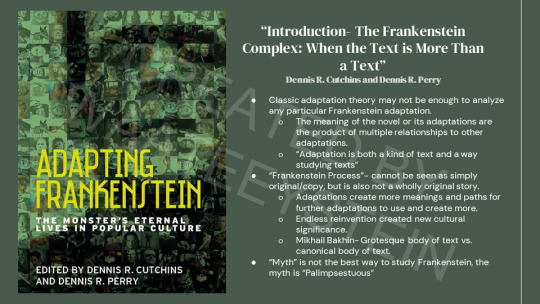
Basically Cutchins and Perry assert that traditional adaptation theory is simple not enough to properly study Frankenstein and it's innumerable adaptations. One might also assert that Frankenstein itself is an adaptation, Mary Shelley published multiple editions of her story, and one could argue that the original story is an adaptation of other stories like "Paradise Lost." Linda Hutcheon, another academic in the field of adaptation studies who also wrote a fantastic book (cited at the end), talks about this idea of "palimpsestuous Intertextuality." I want to first argue here that the original text of Frankenstein and its adaptations (the "myth" of Frankenstein) are palimpsestuous.
And when I say the "myth" of Frankenstein is "palimpsestuous," its basically just saying that the "myth" (tall green guy with bolts in his neck who is mostly non-verbal, going around killing people mostly without rhyme or reason) is the predominate cultural narrative of Frankenstein's monster, rather than how he actually is in the book. All of the cultural ideas of what Frankenstein's monster is are this giant network which interweaves with itself, references and builds off itself, and constantly creates new things from these connections. The book and it's adaptations are not in hierarchy, one is not implicitly better or more important than another, they all work together to create our cultural narrative of Frankenstein's monster. Thus, palimpsestuous Intertextuality.
But what is this "Complex" theory I mentioned earlier, and what does it have to do with Nick Dear? Well, here is a helpful diagram!
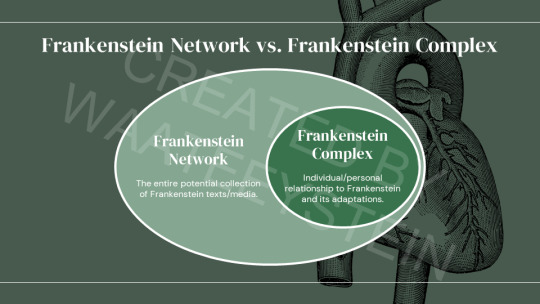
Essentially, every piece of Frankenstein media every created, including Mary Shelley's original novel, are all part of the "Frankenstein Network." The complex, however, is personal, it includes anything from that network that you have personally consumed. Some people have a wider complex than others, but nonetheless, most of us have some kind of Frankenstein Complex (if you're this far in the post I'm assuming you have one lol.) I think Cutchins and Perry really popped off when they created this theory, its a fantastic way of studying/teaching adaptation.
But onto Nick Dear. Why did I just spend so much time covering adaptation theory and teaching you all a bunch of academic jargon? Well firstly, I spent a lot of time on that research for class and I wanted to share. But secondly and more importantly, my thesis for this entire post is that Nick Dear, whose goal with his play was to create an adaptation which humanized the Creature and sticks very close to the novel, created something that was unintentionally more a product of his personal complex and the palimpsestuous "myth" of Frankenstein's monster. He wrote a play that deeply mischaracterizes the Creature, and in turn uses violence and SA for shock value rather than substance.
And maybe this is a bold claim, but I think comparing the plot of the novel (from the creature's point of view) and the plot of Dear's play is a good place to start. And for your visual reference, I created a plot diagram for both so that we can compare the two side-by-side. (Thanks Freytag lol.)
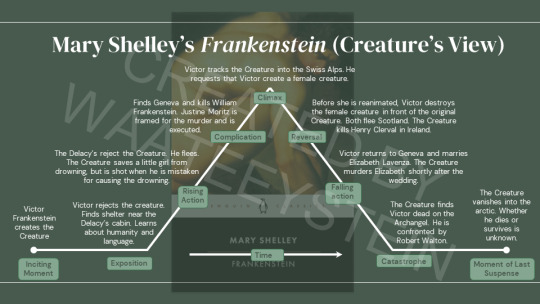
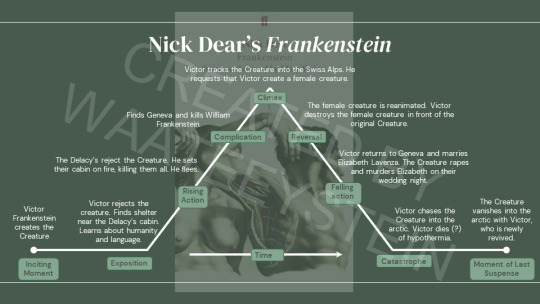
The first thing we can notice about comparing the overall plot structure is that they are indeed, very similar. And this tends to be most people's reactions to seeing this play. That compared to most other Frankenstein media, it is super faithful to the book in terms of setting and characters and hitting important plot points. And I too want to praise Dear for that. I think he was extremely smart about what characters he chose to cut or combine, and the plot points he chose to include. I also personally love that despite the cutting of Walton's character, Victor and the Creature still visit the arctic at the end of the play. Dear made so many great choices with his play, but ends up squandering it his mischaracterization of the Creature.
But how is he mischaracterizing the Creature? Well first, lets look at how Shelley characterizes him in the book, specifically in terms of violence. I argue, that anytime the Creature kills someone in the book, it is a mostly equal/proportionate reaction to the violence done against him. His first murder his killing William, and the subsequent execution of Justine after he frames her for William's murder. All of this comes after Victor's initial rejection of the Creature, and rejection by multiple villages, the DeLacey's and the young drowning girl and her father. Killing William and Justine was his first retribution after all of the rejection and violence against him, which was initiated by Victor creating him and rejecting him in the first place. And this is his only planned revenge at that point, his next move was demanding that Victor create a female creature for him, with the plan to flee and live a peaceful life in South America (whether he actually meant what he said is up to interpretation.) His next murders only come after Victor destroys the unfished female creature. This is when the Creature kills Henry and then Elizabeth. Elizabeth (and arguably Henry) are Victor's partners, and the people he most personally loves. Killing them is direct retribution for Victor destroying the female Creature, who was supposed to be (at least from the Creature's perspective) the Creature's romantic partner. All of the Creature's direct murders are direct mirrors to Victor's transgressions against the Creature. William is killed for the initial rejection and subsequent exiling from society, Henry and Elizabeth are killed for the destruction of his future romantic partner.
Dear takes a different approach in adapting these murders. In his play, the Creature's first murder is not William, but is actually the DeLacey's. After being personally tutored by Father DeLacey for a significant amount of time, the eventual and fated meeting with Felix and Agatha arrives and the creature is rejected by them. Instead of going straight to Geneva, as he does in the novel, he first sets fire to the DeLacey's cabin, killing the entire family inside. To me, this feels like the first instance of spectacle and shock over actual substance. In both Shelley's novel and Dear's play, as the creature learns about humanity and war, he clearly has a distaste for violence and killing. And because of this, I don't understand why the Creature has such an extreme reaction to the DeLacey's, especially in this version where Father DeLacey shows him so much direct kindness, and it is Felix and Agatha specifically who reject him. Why would the Creature decide to kill them all? If Dear wanted to add additional deaths, why not just kill Felix and Agatha and spare Father DeLacey because of his previous kindness? This violence, to me, feels undeserved and does not mirror the violence done against him by this family. From a staging perspective, the visual of the house burning is actually a very impressive collaboration between the set and lighting designers on the giant stage of the National Theatre. But I question why this moment needs to be here, when the rest of the play and it's staging in the premier production already has so much beauty and shock and spectacle. This is also the first moment where I find the Creature unsympathetic, because this action seems overly extreme as a response.
After this moment, the murder of William is different but not too dissimilar in tone to the novel. At it's heart, it is still the Creature's first direct revenge against Victor. After this, our next big departure from the novel is when the female creature is fully brought to life, different to the novel where she is never fully given life. Victor killing her after she has been able to briefly live is a more extreme measure on Victor's part too, which by my own argument, may warrant a more extreme reaction from the Creature. And to be absolutely clear, Victor simply kills/dismantles her, and nothing more. As for the creature's reaction, Henry is a cut character in this adaptation, so we obviously don't see his death. Instead, the Creature kills Elizabeth, but in this version, not only does the creature kill her, he also r*pes her. This is my biggest point of contention with the play. To me, the subtext in Dear's version is that the Creature views both Elizabeth and the Female Creature as some kind of property, and when his property (the female Creature) is taken away by Victor, he takes Victor's property (Elizabeth) away too. Right before her death in the play, the Creature and Elizabeth actually have a really touching conversation, and they seem to genuinely bond. And so when the Creature eventually kills her afterwards, him r*ping her comes completely out of left field. The only explanation to me, is that despite empathizing with her, the Creature ultimately still views her as Victor's property, and needed to take her away from Victor in a way that was more than just taking her life from him. And honestly, it's a really gross interpretation of these characters. And I want to be very clear that I know depiction is not endorsement, and that I also believe there is a time and a place for depicting SA on stage, but this play was not the time nor the place. The creature simply killing Elizabeth is enough to get the point across, the SA seems to have been added for pure shock value, and again, spectacle. One could argue that this action done by the creature is part of his sexual awakening, just as he learns about other aspects of humanity. But again I believe this is not justified by the text of the play, and is written for pure shock value at the expense of another character, specifically a woman. I would call this misogynistic.
And these extreme reactions from the Creature in Dear's play seem to create this hyper-masculinized version of the character and the story. And I think that is a shame considering the original story was written by a woman, and Mary Shelley did a fantastic job of writing a story where the men can exist across a spectrum of masculinity, without needing to be this stereotyped version of hypermasculinity with a desire for sexual vengeance. I mean, Victor creating the Creature is a pretty clear metaphor for motherhood/parenthood, especially considering Shelley's experience with motherhood and the loss of her children and her own mother. And not to say that a cis man isn't capable of writing an authentic adaptation of a woman's story, but here, I think Nick Dear missed the mark, especially in regards to Elizabeth's death and his depiction of Creature/masculinity.
And I don't want to boil this down to, "Nick Dear is a man and therefore his adaption is automatically bad." Because I don't think that's the case, and I think that's an unfair assumption to make. What I do think, is that despite trying to make an adaptation that strove to humanize the Creature better than most other adaptations, Dear instead created an adaptation that fell into the overly-violent monster tropes of the greater Frankenstein Network of adaptations. In essence, Dear may have unintentionally become a product of his own "complex." And unfortunately, that subconscious influence may be partially why we get this interpretation of the Creature, and the unnecessary shock factors added into the story.
So where do we go from here? Chances are, if you see a theatre company putting on a production of Frankenstein, it's probably the Nick Dear version. This was the case for me last October when I accidentally attended a production of this script at a professional theatre company back home in Florida. My hope is that one day we can move on from this script, and find a Frankenstein play adaptation that humanizes the Creature in a way that most audiences (who probably have not read the book) are unfamiliar with, while also not resorting to shock value that dehumanizes the women in the story. My homework for myself beyond this research project, is to read more Frankenstein play adaptations, and specifically ones that are not written by cis men. I think the experiences of women, trans people and disabled people (or obviously any intersection of these communities and identities) could really lend themselves to new and exciting interpretations of the script that bring broader perspectives into context. If you have any suggestions of Frankenstein plays or playwrights who have written Frankenstein plays, I would love to check them out! I also suggest giving the National Theatre world premier pro-shot of Nick Dear's Frankenstein a watch, purely just for the design of the show. Costumes, set, sound and lighting are all really spectacular, and I would love to do an analysis of that aspect of the show one day.
Obviously there was a lot about this show I didn't cover (Cumberbatch, I know), I just wanted to cover the characterization of the Creature at a textual level, because to me that is the most glaring issue with this play. Please let me know your thoughts, and thanks for reading if you got this far!
Citations (I didn't do a great job of referencing these in-text, but all of these sources are great and I highly recommend checking them out!)
Cutchins, Dennis R, and Dennis R Perry. “Introduction- The Frankenstein Complex: When the text is more than a text.” Adapting Frankenstein: The Monster’s Eternal Lives in Popular Culture, Manchester University Press, Manchester, 2018, pp. 1–19.
Dear, Nick, and Mary Wollstonecraft Shelley. Frankenstein: Based on the Novel by Mary Shelley. Faber and Faber, 2011.
Hutcheon, Linda. “Beginning to Theorize Adaptation: What? Who? Why? How? Where? When?” A Theory of Adaptation, Routledge, New York, New York, 2006, pp. 1–32.
Jones, Kelly. “Adaptations of ‘liveness’ in theatrical representations of Mary Shelley’s Frankenstein.” Adapting Frankenstein: The Monster’s Eternal Lives in Popular Culture, Manchester University Press, Manchester, 2018, pp. 316–334.
Pfeiffer, Lee. “Frankenstein: Film by Whale [1931].” Encyclopædia Britannica, Encyclopædia Britannica, inc., 24 Nov. 2023, www.britannica.com/topic/Frankenstein-film-by-Whale.
Shelley, Mary. Frankenstein; or, The Modern Prometheus. 1818.
Shelley, Mary. Frankenstein; or, The Modern Prometheus. 1831.
#please be nice in the replys!#I hope you all enjoyed this little read#I spent a day writing this instead of doing my actual time sensitive work#frankenstein#frankenstein or the modern prometheus#victor frankenstein#frankenstein monster#mary shelley#nick dear#nick dear frankenstein#script analysis#play analysis#Frankenstein play#waateeystein speaks#waateeystein reviews
15 notes
·
View notes
Text
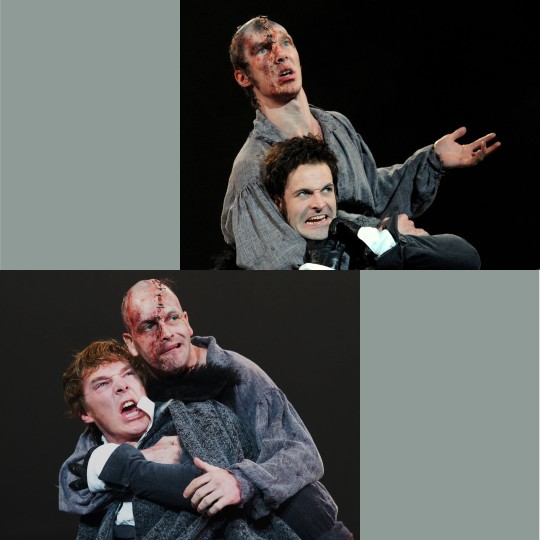
Forty Days of Frankenstein, Day Forty: And here we are, day forty. Don’t despair, though. Between tomorrow and Hallowe’en, I’ll be sharing some late-breaking Frankensteins I found just this year (in my neverending Frankenquest) that were too late to make the first round. Tonight, though, I bring you something extra special. If you care at all about Frankenstein, you should see this if you ever get a chance. If you only see one modern Frankenstein interpretation, see this one (hard to believe it’s already 12 years old). Back in 2011, director Danny Boyle brought Nick Dear’s script for Frankenstein to the Royal National Theatre stage in London. Starring in it were Benedict Cumberbatch and Jonny Lee Miller—but with a twist. In a mind-bending tour-de-force, the two actors alternated between playing Victor Frankenstein and the Creature! From time to time this gets a re-release to cinemas, even though it was originally live on stage. Frustratingly, so far, none of the powers-that-be will release it to home video, so just keep an eye out!
24 notes
·
View notes
Text

I just did a recent re-watch of the 1995 version of "PERSUASION". There was something in this film that I found baffling.
In the movie, Mr. William Elliot, who is the main heroine's cousin and heir presumptive to her father, Sir Walter Elliot, had earlier married a wealthy woman from a lower class. She eventually died, leaving Mr. Elliot a wealthy man. But despite his wealth, Mr. Elliot attempted to reconnect with the family in order to ensure that Sir Walter would never remarry and produce an heir, which would prevent Mr. Elliot from inheriting Sir Walter's baronetcy and estate.
But in the 1995 version of "PERSUASION", Mr. Elliot had spent all of his late wife's money, making him barely penniless again. I never understood why screenwriter Nick Dear had allowed Mr. Elliot to lose his wealth. This doesn't make sense to me. This means Mr. Elliot would be forced to choose between finding another wealthy wife or marrying one of his less affluent Elliot cousins in order to prevent Sir Walter of ever remarrying. Dear had Mr. Elliot pursuing his cousin Anne Elliot anyway. But what would have happened if he had married Anne and spent her dowry? Then what? Especially since the very healthy Sir Walter would have lived a good number of years down the road. Did Nick Dear consider the ramifications of this change?
5 notes
·
View notes
Text

Danny Boyles spektakuläre Frankenstein-Inszenierung am National Theatre, die die Boris-Karloff-Erwartungen ziemlich unterwandert (dafür gibt es die dort ignorierten Schrecken des Eises und der Finsternis) gibt es in einer Fassung mit Benedict Cumberbatch als Monster -Verzeihung!: Geschöpf und Johnny Lee Miller als Frankenstein und ungekehrt. Ich entschied mich für Johnny als Geschöpf. Ist große Schauspielkunst. Umgekehrt aber wahrscheinlich natürlich auch. Ich weiß nicht, ob ich da jetzt Nerven für vergleichende Studien habe, habe aber gleich anzufangen, das Buchzu lesen. Erfahren Sie in der nächsten Leseliste, ob ich durchgehalten habe.
0 notes
Text






letters to vera by vladimir nabokov
#heartstopperedit#heartstopper#narlieedit#narlie#nick x charlie#nick nelson#charlie spring#mine#vladimir nabokov#(dear lord his letters to his wife)#anyway charlie spring loves nick nelson! did you know?#nick makes him so so happy!#a last farewell to 2024! hope you have a nice last day of it <3
398 notes
·
View notes
Text

#so many options in muscle groups to hang onto for dear life#heartstopper#heartstopper show#heartstopper season 3#heartstopper s3#kit connor#nick nelson#charlie spring#joe locke#narlie#nick x charlie#nick and charlie#osemanverse#heartstoppercentral#mine#pin#pinned#stills#chaotic nick and charlie#charlie x nick
193 notes
·
View notes
Text


#trainofthought#psychonauts#psychonauts 2 spoiler#nick johnsmith#gristol malik#Based on something my dear girlfreak told me#i love those 2 images alot
765 notes
·
View notes
Text


thinkin about folio rn
source
#oh my god fuck me sideways and upside down#dear god help me#bad omens#bad omens band#bad omens cult#Nick folio#fuck it up folio#nick folio bad omens#drumming
220 notes
·
View notes
Text






Doodle dump from insta requests
#mj arts#be more chill#dear evan hansen#ohshc#ouran high school host club#left 4 dead#left 4 dead 2#l4d#l4d2#the owl house#amphibia#jeremy heere#rich goranski#richjer#evan hansen#jared kleinman#kleinsen#connor murphy#treebros#alana beck#haruhi fujioka#l4d francis#l4d2 nick#luz noceda#amity blight#lumity#sasha waybright#anne boonchuy#marcy wu#sashannarcy
85 notes
·
View notes
Text
MOVIN' RIGHT ALONG!
youtube
Eddie's VA Tunnelberg, aka Joshua Waters and I worked together on a cover of the famous song from The Muppet Movie.
Featuring special guest Nick Nocturn of NightMind!
Joshua's Twitter: https://x.com/TunnelVa
Nick's Twitter: https://x.com/NM_NickNocturne
With Art by @glowbat
Mixing by @joezcafe
And video editing by @kmodoposts
Thanks for everyone who worked together and helped make this happen!
#welcome home#barnaby b beagle#howdy pillar#welcome home arg#welcome home barnaby#welcome home howdy#welcome home puppet show#Cover#song cover#the muppets#kermit the frog#fozzie bear#movin right along#night mind#nick nocturne#eddie dear#Youtube
375 notes
·
View notes
Text
absolutely blessed w finding this last night

#dear god#nick ruffilo#i can’t take it#plsplspls#i’m losing my goddamn mind#nicholas ruffilo#bad omens#bad omens cult#noah sebastian#joakim karlsson#jolly karlsson#matt dierkes#nick folio
132 notes
·
View notes
Text
Hope is optimism with a broken heart.
Nick Cave, in Faith, Hope and Carnage
670 notes
·
View notes
Text
I’ll follow you down ‘til the sound of my voice will haunt you.
#silver springs#fleetwood mac#fleetwood mac rumours#stevie nicks#female hysteria#female manipulator#female rage#femcel#girlblogging#i’m just a girl#girlhood#this is a girlblog#digital diary#my girlblog#this is what makes us girls#dear diary#just girly things#lyrics#lyric posting#lyric quotes#lana del ray aka lizzy grant#divine feminine#i’m literally just a girl#girl blogger#hell is a teenage girl#girl interupted syndrome#manic pixie dream girl#gaslight gatekeep girlboss
64 notes
·
View notes